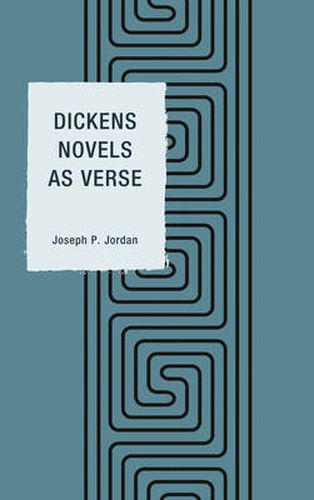Readings Newsletter
Become a Readings Member to make your shopping experience even easier.
Sign in or sign up for free!
You’re not far away from qualifying for FREE standard shipping within Australia
You’ve qualified for FREE standard shipping within Australia
The cart is loading…






As its startling and aggressive title suggests, Dickens Novels as Verse is no standard work of literary criticism. It is, in fact, altogether new and original. Jordan likens the experience of some of the great Dickens novels, particularly the later ones (namely, A Tale of Two Cities, Great Expectations and Our Mutual Friend) to the experience of lyric verse. The point is not that Dickens novels could ever be mistaken for lyric poems, but that the experience of some of the best of Dickens’s novels, despite their undoubted sprawl, is like the experience of lyric poems-is so because the novels are made up of the same things that make great verse great: intricate, largely unnoticeable tissues of alliteration-like patterning that net across the work and give narratively insignificant coherence to it. Dickens Novels as Verse meticulously describes these book-length patterns in clear, lucid prose. Its three chapters, each focused on a single Dickens novel, are full of close analyses that can be immediately used by teachers, students, and all other readers of Dickens to grasp why Dickens always seems to be a greater writer than the quality of his ideas might lead us to expect.
$9.00 standard shipping within Australia
FREE standard shipping within Australia for orders over $100.00
Express & International shipping calculated at checkout
As its startling and aggressive title suggests, Dickens Novels as Verse is no standard work of literary criticism. It is, in fact, altogether new and original. Jordan likens the experience of some of the great Dickens novels, particularly the later ones (namely, A Tale of Two Cities, Great Expectations and Our Mutual Friend) to the experience of lyric verse. The point is not that Dickens novels could ever be mistaken for lyric poems, but that the experience of some of the best of Dickens’s novels, despite their undoubted sprawl, is like the experience of lyric poems-is so because the novels are made up of the same things that make great verse great: intricate, largely unnoticeable tissues of alliteration-like patterning that net across the work and give narratively insignificant coherence to it. Dickens Novels as Verse meticulously describes these book-length patterns in clear, lucid prose. Its three chapters, each focused on a single Dickens novel, are full of close analyses that can be immediately used by teachers, students, and all other readers of Dickens to grasp why Dickens always seems to be a greater writer than the quality of his ideas might lead us to expect.